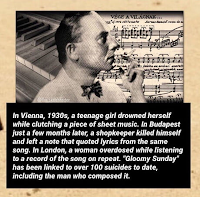The Hungarian Suicide Song - Gloomy Sunday
Gloomy Sunday - the notorious 'Hungarian Suicide Song' - was written in 1933. Its melody and original lyrics were the creation of Rezső Seress, a self-taught pianist and composer born in Hungary in 1899.
The crushing hopelessness and bitter despair that characterized the two stanzas penned by Seress were superseded by the more mournful, melancholic verses of Hungarian poet László Jávor.

When the song came to public attention it quickly earned its reputation as a 'suicide song'. Reports from Hungary alleged individuals had taken their lives after listening to the haunting melody, or that the lyrics had been left with their last letters.
The lyricists Sam M. Lewis and Desmond Carter each penned an English translation of the song. It was Lewis's version, first recorded by Hal Kemp and his Orchestra, with Bob Allen on vocals (1936), that was to become the most widely covered.
The popularity of Gloomy Sunday increased greatly through its interpretation by Billie Holiday (1941). In an attempt to alleviate the pessimistic tone a third stanza was added to this version, giving the song a dreamy twist, yet still, the suicide reputation remained. Gloomy Sunday was banned from the playlists of major radio broadcasters around the world. The B.B.C. deemed it too depressing for the airwaves.
People continued to buy the recordings; some committed suicide.
Rezső Seress jumped to his death from his flat in 1968.






0 Comments